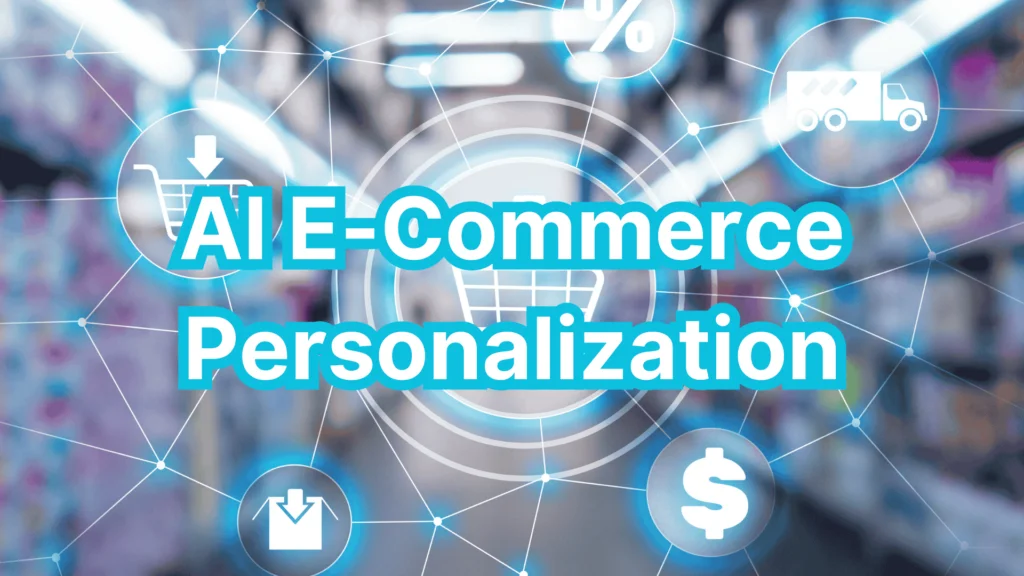AI E-Commerce Personalization: Revolutionizing Online Shopping

Introduction to AI E-Commerce Personalization
Customer experience is the seat of value in the e-commerce space and the ability to personalize experiences is the ace. People want customized experiences in the present world and any business that does not deliver this will lag behind. This is where AI e-commerce personalization fills the gap and changes the way online stores can approach customers. With the help of advanced search engines, and through generative AI e-commerce personalization, the context of internet shopping is revolutionizing the future of retail.
AI E-commerce Personalization: A Literature Review on its Evolution
In AI e-commerce personalization, we’ve seen this customizability feature for quite some time now being incorporated into online business. Nevertheless, conventional practices could only go as far as offering general advice and single-broadcast email marketing. The use of AI in e-commerce has changed this method because the company is now capable of creating highly personalized experiences at the same scale.
AI applications involve the use of big data obtained from different sources like browsing history, past purchase history and even social media activity to develop profiles of users. Such profiles enable e-commerce platforms to offer relevant recommendations, content, and products and services with adjusted prices reflecting the user’s interests.

AI Tools for E-Commerce: Improving the Shopping Experience
The use of AI in online shopping has expanded the marketplace into having a plethora of AI tools for ecommerce that improve the customer experience. These tools are intended not only for improving the stages of finding and purchasing products, but also for improving customer service.
- Product Discovery: AI-based applications assist customers in finding products they would not have otherwise considered. Expanded through machine learning of customer preferences, these tools filter and display the products, that the customer might find more relevant. For example, the H&M clothing company uses AI to identify search history and shopping patterns in order to select clothes that would fit a person’s taste.
- Customer Service Automation: Chatbots have become the norm across all e-commerce sites where they can enable brands to provide round-the-clock customer service. NLP (natural language processing) enabled chatbots to interpret customer questions and offer efficient and accurate answers. For example, Sephora has created an Artificial Intelligence program called Sephora Virtual Artist that helps customers by answering their questions, suggesting products, and even allowing the customers to ‘try on’ makeup virtually.
- Inventory Management: AI tools assist in identifying the probable inventory needs by analyzing the past sales records and factors like seasons etc. With the help of AI for inventory management, firms have an opportunity to control the stock more effectively, and avoid overstock or understock conditions, satisfying the customer needs.
AI Search for E-Commerce
The most important utilization of AI in online shopping is in the area of search capabilities. The problem with most of the conventional search engines is that they cannot interpret customer’s queries well hence offering incongruent results. Unlike traditional search engines, the newly developed AI technologies include NLP and ML capabilities to analyze and understand the context of the search string for better and relevant results. This enhances the customer’s chances of finding exactly what they want hence enhancing the conversion rates.
For instance, an AI ecommerce platform can use the prospect’s previous conduct to foresee what they may be searching for, before they finish forming their search terms. Such a level of personalization is beneficial when it comes to improving the user experience and at the same time decreasing the amount of time spent in search of the desired products.
Generative AI ECommerce Solutions
Clearly, generative AI has been emerging in different sectors, and the e-commerce sector is not an exception. The automations incorporated by generative AI ecommerce solutions include the ability to generate new content, for instance, descriptions, images and even websites relying on input. This technology is helpful for e-commerce companies where they need to control big stocks or change their products often.
For instance, a generative AI ecommerce tool can write new product descriptions that would be adequately SEO keyworded and have a similar appearance throughout the site. The use of AI in generating images can generate product images that are specific to the various customer segments. This thus improves on matters of personalization.
AI Store Builders: The Future of E Business Platforms
That is why creating an online store from scratch can be quite challenging, especially for small companies or start-ups. New store-builders are coming up with ecommerce AI tools that make it very easy to build and operate online stores.
These AI ecommerce platforms employ machine learning to make business market analyses on market trends, competitors, and consumers to create stores that are efficient and customer-friendly. AI store builders can also automate different tasks of store management e.g. stocking, changing prices, and initiating marketing campaigns. This frees the business owner’s time for developing the store.
A Perspective View of using AI for Engaging Customers
With customer engagement, personalization is not restricted to recommendation systems or search capabilities. But this has an important role to play in customer experience. AI solutions for ecommerce are being adopted to provide targeted marketing messages customer support, and even loyalty schemes.
Personalized Marketing Campaigns
The ability to use AI to create customer-oriented marketing segments makes it easy for e-commerce companies to sell to people. AI tools can segment audiences according to their preference, behavior, and buying patterns with the help of customer’s data. This will allow businesses to send emails, social media posts, in-app notification, or messages, likely to result in a purchase.
For instance, an AI tool may find out that there is a group of customers who often buy running shoes. The e-commerce business can then follow up with new arrivals in running shoes, brand-specific discounts, plus other relevant content. Such a level of personalization improves the probability of getting a response and also leads to second purchases.
AI-Driven Customer Support
Another important application of AI for ecommerce which is proving to be highly useful is the use of customer support. Programmed chatbots and virtual assistants can support customers in actual time by solving their difficulties and answering their questions.
It’s important that these AI-backed support tools can weigh in on the customer data of their interaction with the brand. Thus, this can be used to provide the right information and recommendations. For instance, if a customer has previously ordered a certain product, the AI tool will provide tips on its use or will recommend some other products, which will be helpful for improving customer satisfaction. To learn more on how AI is transforming customer support, visit here.
The Benefit of AI for Ecommerce Business
AI for ecommerce business has significant implications for clients’ satisfaction and business expansions. By creating these unique experiences, companies stand to gain higher customer loyalty and therefore increase the customers’ lifetime value.
Also, AI e-commerce personalization can help to increase the overall revenues of companies considerably. Research shows that organizations adopting AI-based personalization experience higher conversions, order values, and customer loyalty. This is because AI makes it possible to predict customers’ demands and provide them with offers that reflect their interests.
AI E-Commerce Personalization: Overcoming Challenges
That said, it is crucial to point out that AI in e-commerce personalization has its drawbacks, which need to be considered by businesses to learn how to leverage this tool effectively. For instance, data privacy is a massive problem because customers are increasingly becoming more sensitive to how their data is being used. Companies must clearly disclose data sources and purposes, giving customers control over their personal information.
Moreover, the adaptation of AI solutions in ecommerce needs a specific extent of technical know-how and investment. Businesses need to spend on proper AI e-commerce personalization solutions and ensure employees know how to harness these tools.
Ethical Aspects of AI-driven Personalization of E-Commerce
As AI deepens personalization, the question of ethical use arises into the picture. In as much as it is advisable for companies to personalize their products, some limits have to be drawn so that privacy of clients is not intruded upon. Companies already use data to improve the shopping experience and should be careful not to cross the line into violating the customers’ privacy. There should be clear and open information, and users should have the ability to manage their data.
Furthermore, AI algorithms that contribute to the bias should also be avoided by firms. First, AI systems, training on legacy databases, will provide prejudiced recommendations thus promoting biases for specific groups. For this reason, businesses need to guarantee that AI models are subjected to an assessment and amendment of bias on a frequent basis.
Conclusion: The Future of AI E-commerce Personalization
With constant developments in the field of AI, the application of personalization to e-commerce has only scratched the surface. What is available today is only the start; from AI search for ecommerce to generative AI ecommerce solutions. As we move forward in the future years, we are likely to observe even newer advancements that apply AI within the online shopping context in order to optimize the e-shopping experience for everyone.
For e-commerce businesses, the message is clear: Adopt AI for personalization or be ready to lag behind. Using AI solutions for ecommerce, companies can design experiences that could go beyond expectations. This will help them develop sustainable strategies in the world of ecommerce.